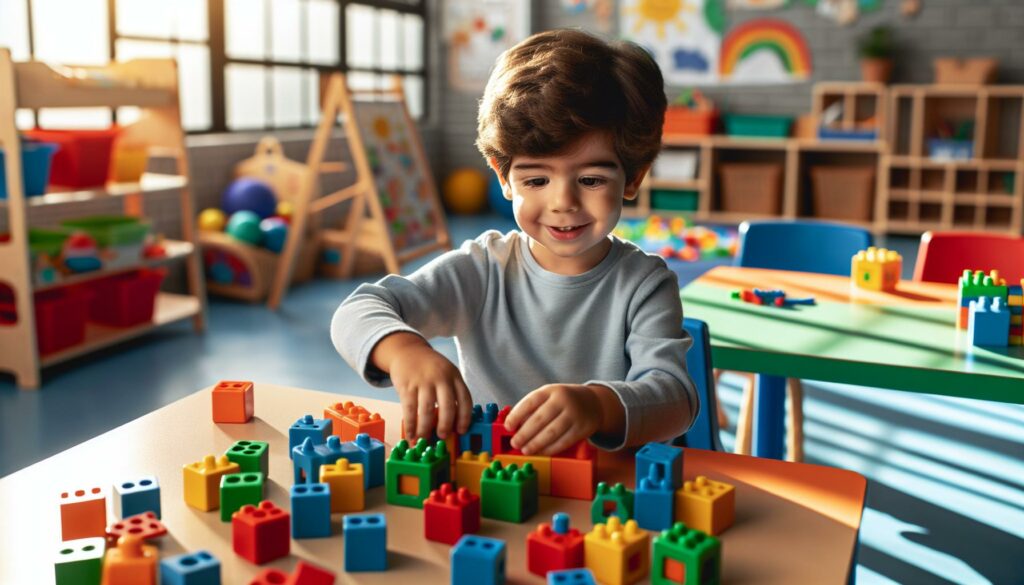Understanding how children develop cognitive skills is fascinating. One key concept in child development is seriation, which refers to the ability to arrange objects in a logical order based on size, shape, or other attributes. This skill plays a crucial role in a child’s overall cognitive growth, helping them make sense of the world around them.
As I explore seriation, I’ll delve into its significance in early childhood education and how it lays the groundwork for more complex problem-solving abilities. Recognizing the stages of seriation can enhance our approach to nurturing young minds, ensuring they build a strong foundation for future learning. Let’s dive into the world of seriation and discover how it shapes a child’s developmental journey.
 Key Takeaways
Key Takeaways
- Definition of Seriation: Seriation involves arranging objects systematically based on attributes like size, shape, or color, and typically emerges in early childhood (ages 3-5).
- Cognitive Growth: Mastering seriation enhances logical thinking, spatial awareness, and cognitive skills essential for mathematics and problem-solving.
- Developmental Stages: Seriation skills progress through stages; early childhood focuses on basic sequencing, while middle childhood involves refining abilities to sort multiple attributes.
- Influences on Development: Cognitive development theories (e.g., Piaget and Vygotsky) and environmental factors, such as diverse play materials and parental involvement, significantly affect seriation skills.
- Engaging Activities: Incorporating sorting games, puzzles, and everyday tasks like cooking or organizing toys helps enhance children’s seriation abilities and logical thinking.
Seriation Child Development
Seriation child development represents a key cognitive skill that allows children to arrange objects in a systematic order based on varying characteristics, such as size, shape, or color. Mastering this skill lays a strong foundation for more complex problem-solving capabilities.
Definition of Seriation
Seriation involves organizing items sequentially according to specific attributes. For example, children may order blocks from smallest to largest or group animals by color. It reflects a child’s understanding of relationships between different objects. This skill typically emerges around the ages of 3 to 5, as children begin to grasp concepts of size and sequence.
Importance of Seriation in Cognitive Growth
 Seriation significantly contributes to cognitive development by enhancing logical thinking and reasoning skills. Engaging in seriation tasks fosters spatial awareness and the ability to classify objects. Such skills are essential for mathematics, critical thinking, and science.
Seriation significantly contributes to cognitive development by enhancing logical thinking and reasoning skills. Engaging in seriation tasks fosters spatial awareness and the ability to classify objects. Such skills are essential for mathematics, critical thinking, and science.
By practicing seriation, children also improve their memory and attention span, as they must recall attributes and maintain focus while arranging items. Encouraging seriation in early education leads to improved problem-solving abilities and a deeper understanding of how to organize information effectively.
Stages of Seriation Development
Seriation develops through distinct stages in a child’s cognitive growth. Each stage reflects advancements in the ability to organize and categorize objects logically.
Early Childhood: Initial Understanding
Early childhood, typically from ages 3 to 5, marks the initial understanding of seriation. Children begin to grasp basic concepts of size and order. They arrange objects in simple sequences, often based on one attribute, such as size or color. For example, a child might line up blocks from smallest to largest, demonstrating their emerging recognition of relationships between items. Engaging in activities like sorting toys or stacking objects reinforces these foundational skills, promoting cognitive development and preparation for more complex tasks.
Middle Childhood: Refinement of Skills
Middle childhood, roughly ages 6 to 8, represents a period of refinement in seriation skills. Children can manage multiple attributes, such as size, shape, and color, while organizing items. They begin to understand the need for logic and can manipulate the order of items based on varying criteria. For instance, a child might categorize a set of colored pencils by both color and length, showcasing their enhanced reasoning abilities. This stage lays the groundwork for greater problem-solving skills and deeper comprehension of mathematical concepts, as children become more adept at classifying and organizing information systematically.
Factors Influencing Seriation Skills
Seriation skills develop through various influences that shape a child’s cognitive and social experiences. Understanding these factors can enhance strategies for fostering seriation in early education.
Cognitive Development Theories
Cognitive development theories explain how children evolve mentally, impacting their seriation abilities. Piaget’s theory outlines that children progress through stages, beginning with the preoperational stage (ages 2 to 7). In this stage, children start recognizing and organizing objects based on specific attributes. Vygotsky’s sociocultural theory emphasizes the role of social interactions in cognitive growth, suggesting that collaborative activities enhance children’s ability to arrange objects logically. When children engage in guided play with peers or adults, they develop a clearer understanding of relationships among objects, fostering their seriation skills.
Environmental Influences
 Environmental factors significantly shape seriation development. Access to diverse play materials encourages experimentation with different attributes. For instance, using building blocks of various sizes and colors allows children to practice arranging and comparing items. Family involvement also plays a critical role; parents who incorporate sorting and categorizing tasks during everyday activities help reinforce seriation skills.
Environmental factors significantly shape seriation development. Access to diverse play materials encourages experimentation with different attributes. For instance, using building blocks of various sizes and colors allows children to practice arranging and comparing items. Family involvement also plays a critical role; parents who incorporate sorting and categorizing tasks during everyday activities help reinforce seriation skills.
Educational settings that foster hands-on learning experiences, such as interactive games and structured activities, further support the development of logical sequences among objects. The more varied the environment, the broader the opportunities for children to engage in seriation activities, enhancing their cognitive growth.
Activities to Enhance Seriation Skills
Engaging in various activities can effectively enhance seriation skills in children. These activities incorporate both structured and unstructured play to promote logical thinking and organization.
Educational Games and Tools
Using educational games and tools fosters seriation development.
- Sorting Games: Games involving sorting objects by size, shape, or color encourage children to recognize patterns and relationships.
- Puzzles: Simple puzzles with varying sizes require children to arrange pieces logically and strengthen problem-solving skills.
- Block Building: Building with blocks allows for grouping by attributes, sequencing sizes, or creating patterns.
- Card Games: Card games like Uno or matching games challenge children to categorize cards and recognize similarities and differences.
Everyday Activities to Practice Seriation
Incorporating seriation activities into daily routines offers practical learning opportunities.
- Cooking Together: Involving children in cooking tasks, like measuring ingredients, helps them understand size and sequence.
- Organizing Toys: Encouraging children to sort and organize toys by color, shape, or size reinforces their ability to categorize objects.
- Outdoor Activities: Nature walks provide opportunities to collect leaves or rocks, allowing children to sort items by size or color.
- Gardening: Planting seeds in rows or arranging flowers by height aids in developing understanding of order and arrangement.
Cognitive Development in Kids
Fostering seriation child development skills in young children is crucial for their cognitive development. As they learn to arrange objects based on different attributes, they’re not just playing; they’re building a foundation for critical thinking and problem-solving.
Engaging them in various activities helps reinforce these skills, making learning both fun and effective. By providing diverse experiences and encouraging exploration, I can support their growth and understanding of the world around them.
Ultimately, nurturing seriation in early childhood sets the stage for future academic success and a lifelong love of learning.

